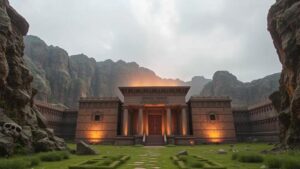Following myths of the “River of Eternity,” believed to cleanse the soul of travelers.
The Myths of the River of Eternity: A Journey Through Belief and Cleansing
The River of Eternity is a captivating legend that transcends cultures and time periods, often depicted as a mystical waterway capable of cleansing the soul of travelers. This article explores the rich tapestry of myths surrounding this enigmatic river, delving into geographical references, historical significances, and the underlying philosophies that have shaped these beliefs.
Origins of the River of Eternity Legend
The origins of the River of Eternity can be traced back to ancient civilizations such as the Greeks, Egyptians, and Indigenous peoples of North America. Each culture offers a unique interpretation, yet they share common threads that emphasize renewal, rebirth, and spiritual purification.
- The ancient Greeks referenced the mythological rivers of the Underworld, such as the Lethe, which was associated with forgetfulness and oblivion, serving as a contrast to the idea of eternal cleansing.
- In Egyptian mythology, the River Nile was considered a source of life and fertility, symbolizing the regeneration of the soul as it flowed through the land of the living and into the afterlife.
- Native American tribes often cite rivers as sacred spaces, where spiritual rituals and cleansing ceremonies are conducted, reinforcing the belief in water’s ability to purify the spirit.
Geographical Significance and Exploratory Accounts
Throughout history, various explorers and scholars have documented rivers that they believed bore resemblance to the mythical River of Eternity. One notable example is the Amazon River, which is described as having transformative qualities. In his 1500s expedition, the Spanish explorer Francisco de Orellana remarked on the healing properties of the Amazonian waters, contributing to its lore.
Also, the rivers of the Himalayas, particularly the Ganges, are often considered sacred in Hinduism, symbolizing both physical and spiritual cleansing. The annual Kumbh Mela pilgrimage attracts millions who seek purification and enlightenment, reinforcing the rivers status as a rejuvenating force.
Philosophical Underpinnings
The myth of the River of Eternity taps into deeper philosophical themes prevalent in many cultural narratives. belief in water as a purifying agent can be seen as an analogy for emotional and spiritual renewal.
- Water is often described as a necessary element for life, suggesting that spiritual cleansing and renewal are essential for the human experience.
- Just as rivers travel through various terrains, experiencing change, so too do individuals experience personal growth and transformation.
Modern Interpretations and Real-World Applications
In contemporary society, many people harness the symbolism of the River of Eternity in therapeutic practices. For example, the practice of water therapy, which includes associations with natural bodies of water, is believed to aid in spiritual and emotional healing. Spending time near rivers or lakes is often encouraged for mental health benefits, connecting individuals to the rejuvenating powers attributed to water throughout history.
Addressing Common Misconceptions
Despite the rich mythology surrounding the River of Eternity, there are misconceptions that can cloud its significance. Some may view it purely as a fantasy or romanticized notion without practical relevance. But, it is essential to recognize the following:
- The myth serves as a cultural reflection of humanity’s deep connection to nature and the elements, particularly water.
- Many rituals and practices inspired by the River of Eternity promote mental wellness, self-care, and a sense of community.
Conclusion: Embracing the Journey of Cleansing
The River of Eternity remains a powerful symbol of purification and renewal, echoing through various cultures and philosophical teachings. By understanding the myths surrounding this enigmatic river, individuals can cultivate a greater appreciation for the metaphorical and literal significance of water in their lives. Engaging with these concepts proactively offers actionable takeaways, such as:
- Integrating time by natural water bodies into mental health practices
- Participating in community rituals that promote spiritual cleansing
Ultimately, the River of Eternity invites us to embark on our journey of cleansing, renewal, and self-discovery, reminding us that the paths we traverse are just as significant as the destinations we seek.


